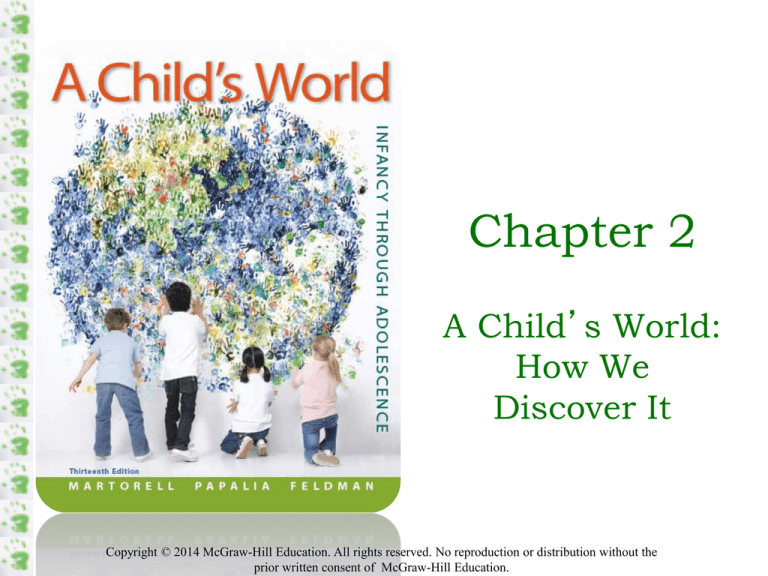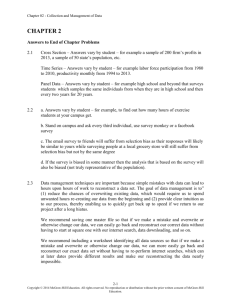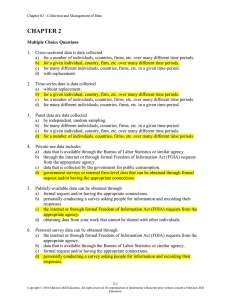
Chapter 2
A Child’s World:
How We
Discover It
Copyright © 2014 McGraw-Hill Education. All rights reserved. No reproduction or distribution without the
prior written consent of McGraw-Hill Education.
Theory
Coherent set of logically related concepts that
seeks to:
Organize
Explain
Guide/Inspire
Predict
Hypotheses
Copyright © 2014 McGraw-Hill Education. All rights reserved. No reproduction or distribution without the
prior written consent of McGraw-Hill Education.
2-2
Basic Theoretical Issues
Nature vs. nurture
Active vs. reactive
Organismic vs. mechanistic
Continuity vs. discontinuity
Quantitative vs. Qualitative
Early vs. later experience
Stability vs. change
Copyright © 2014 McGraw-Hill Education. All rights reserved. No reproduction or distribution without the
prior written consent of McGraw-Hill Education.
2-3
THEORIES OF CHILD
DEVELOPMENT
Psychoanalytic theories:
Freud and Erikson
Behavior is a surface characteristic
Need to understand the symbolic workings of the
mind
Early experiences with parents are emphasized
?
Copyright © 2014 McGraw-Hill Education. All rights reserved. No reproduction or distribution without the
prior written consent of McGraw-Hill Education.
Freud’s Theory
Psychosexual Development
Sigmund Freud (1856–1939)
Parts of personality
Id
Ego
Superego
? ?
Copyright © 2014 McGraw-Hill Education. All rights reserved. No reproduction or distribution without the
prior written consent of McGraw-Hill Education.
Psychosexual Stages
Fixation: Too much or
too little gratification
Copyright © 2014 McGraw-Hill Education. All rights reserved. No reproduction or distribution without the
prior written consent of McGraw-Hill Education.
Erikson’s Theory
Psychosocial Development
Erik Erikson (1902–1994)
Modified and expanded Freud’s theory
Psychosocial crises
Identity
Differences from psychosexual development
Social interactions
Conscious
Active actions
Eight stages
?
Copyright © 2014 McGraw-Hill Education. All rights reserved. No reproduction or distribution without the
prior written consent of McGraw-Hill Education.
Learning Theories
Behaviorism - John B. Watson
Classical conditioning - Ivan Pavlov
Operant conditioning - B. F. Skinner
Observable Behavior; individual passively learn
behaviors
Social Learning Theory
Observational learning – Albert Bandura
Active participants in learning
Copyright © 2014 McGraw-Hill Education. All rights reserved. No reproduction or distribution without the
prior written consent of McGraw-Hill Education.
Behavioral Theories
Pavlov’s classical conditioning
A neutral stimulus acquires the ability to produce a
response originally produced by another stimulus
Skinner’s operant conditioning
The consequences of a behavior produce changes in
the probability of the behavior’s occurrence
A behavior followed by Reinforcement or Punishment
Copyright © 2014 McGraw-Hill Education. All rights reserved. No reproduction or distribution without the
prior written consent of McGraw-Hill Education.
Social Learning Theory
Albert Bandura
Added Social and Cognitive influences to
behaviorism
Observational Learning
Reciprocal Determinism (B E P)
Self-Efficacy
Child is an active learner
Copyright © 2014 McGraw-Hill Education. All rights reserved. No reproduction or distribution without the
prior written consent of McGraw-Hill Education.
The Cognitive Perspective
Focuses on children’s mental processes and the
behavior that reflects those processes
Jean Piaget’s Cognitive-Developmental Theory
Information-Processing Theory
Lev Vygotsky’s Sociocultural Theory
? ?
Copyright © 2014 McGraw-Hill Education. All rights reserved. No reproduction or distribution without the
prior written consent of McGraw-Hill Education.
Piaget’s Cognitive-Developmental
Theory
Worked with Binet on IQ tests for children
Children are “natural physicists”
Developmental
Think different at different ages
Copyright © 2014 McGraw-Hill Education. All rights reserved. No reproduction or distribution without the
prior written consent of McGraw-Hill Education.
PIAGET’S FOUR STAGES OF
COGNITIVE DEVELOPMENT
Copyright © 2014 McGraw-Hill Education. All rights reserved. No reproduction or distribution without the
prior written consent of McGraw-Hill Education.
Piaget’s Basic Concepts
Organization
Schemes
Adaptation
Assimilation
Accommodation
Equilibration
Copyright © 2014 McGraw-Hill Education. All rights reserved. No reproduction or distribution without the
prior written consent of McGraw-Hill Education.
Information-Processing Theory
Influenced by the concepts of computer science
Input, Storage, Processing, Output
Encoding
Memory
Retrieval
Software and Hardware
Mental processes
Brain
Copyright © 2014 McGraw-Hill Education. All rights reserved. No reproduction or distribution without the
prior written consent of McGraw-Hill Education.
Lev Vygotsky’s
Sociocultural Theory
Sociocultural Theory
Culture and social interact to guide cognitive
development
Thoughts are “created” by the culture we live in
and the tools we use
Cognitions are created and live in our social world
Copyright © 2014 McGraw-Hill Education. All rights reserved. No reproduction or distribution without the
prior written consent of McGraw-Hill Education.
The Contextual Perspective
Urie Bronfenbrenner’ s Ecological Theory
Reciprocal interactions between individual
and their environment.
Not a Developmental Theory!
Focuses on systems children participate in
Copyright © 2014 McGraw-Hill Education. All rights reserved. No reproduction or distribution without the
prior written consent of McGraw-Hill Education.
Figure 2.2 - Bronfenbrenner’s
Bioecological Theory
Copyright © 2014 McGraw-Hill Education. All rights reserved. No reproduction or distribution without the
prior written consent of McGraw-Hill Education.
2-18
Evolutionary/Sociobiological
Perspective
E. O. Wilson and Darwin
Ethology: Adaptive behaviors and critical/sensitive
periods. Study animals and apply to humans.
Evolutionary Theory: Survival of the fittest and
development of adaptive behaviors in a particular
society/culture.
Copyright © 2014 McGraw-Hill Education. All rights reserved. No reproduction or distribution without the
prior written consent of McGraw-Hill Education.
Research Methods
Quantitative research: Deals with objectively
measurable data.
Based on scientific method: System of established
principles and processes of scientific inquiry.
Identifies a problem to be studied.
Formulates a hypothesis to be tested by research.
Collects data.
Analyzes the data.
Copyright © 2014 McGraw-Hill Education. All rights reserved. No reproduction or distribution without the
prior written consent of McGraw-Hill Education.
2-20
Research Methods
Forms tentative conclusions.
Disseminates findings.
Qualitative research: Interpretation of
nonnumerical data, such as subjective
experiences, feelings, or beliefs.
Focuses on the how and why of behavior
Informs both how they collect data as well as its
interpretation
Copyright © 2014 McGraw-Hill Education. All rights reserved. No reproduction or distribution without the
prior written consent of McGraw-Hill Education.
2-21
Table 2.3 - Comparing Qualitative
and Quantitative Research
Copyright © 2014 McGraw-Hill Education. All rights reserved. No reproduction or distribution without the
prior written consent of McGraw-Hill Education.
2-22
Sampling
Sample: Group of participants chosen to represent the
entire population under study.
Should adequately represent the population under
study
Type used by quantitative
researchers
• Random selection
• Selection of a sample in
such a way that each person
in a population has an equal
and independent chance of
being chosen.
Type used by qualitative
researchers
• Focused selection
• Participants are chosen for
their ability to communicate
the nature of a certain
experience.
Copyright © 2014 McGraw-Hill Education. All rights reserved. No reproduction or distribution without the
prior written consent of McGraw-Hill Education.
2-23
Table 2.4 - Major Methods of
Data Collection
Copyright © 2014 McGraw-Hill Education. All rights reserved. No reproduction or distribution without the
prior written consent of McGraw-Hill Education.
2-24
Basic Research Designs
Case study: Study of a single subject, such as an
individual or family.
Offers useful in-depth information.
Ethnographic study: In-depth study of a culture, which
uses a combination of methods including participant
observation.
Uses a combination of methods, including informal,
unstructured interviewing and participant observation.
Copyright © 2014 McGraw-Hill Education. All rights reserved. No reproduction or distribution without the
prior written consent of McGraw-Hill Education.
2-25
Basic Research Designs
Participant observation: Observer lives with the people
or participates in the activity being observed.
Correlational study: Intended to discover whether a
statistical relationship between variables exists.
Variables - Phenomena that change or vary among
people or can be varied for purposes of research.
Correlations are expressed in terms of direction and
magnitude.
Copyright © 2014 McGraw-Hill Education. All rights reserved. No reproduction or distribution without the
prior written consent of McGraw-Hill Education.
2-26
Basic Research Designs
Two variables are related positively if they:
Increase or decrease together
Two variables have a negative, or inverse, correlation if:
One increases and the other decreases
Correlations are reported as numbers ranging from +1.0
to –1.0.
Copyright © 2014 McGraw-Hill Education. All rights reserved. No reproduction or distribution without the
prior written consent of McGraw-Hill Education.
2-27
Figure 2.3 - Scatter Plots of Positive,
Negative, and No Correlations
Copyright © 2014 McGraw-Hill Education. All rights reserved. No reproduction or distribution without the
prior written consent of McGraw-Hill Education.
2-28
Basic Research Designs
Experiment: Rigorously controlled, replicable
procedure in which the researcher manipulates
variables to assess the effect of one on the other.
Experimental group: Group receiving the treatment
under study.
Control group: Group of people, similar to those in the
experimental group, who do not receive the treatment
under study.
Copyright © 2014 McGraw-Hill Education. All rights reserved. No reproduction or distribution without the
prior written consent of McGraw-Hill Education.
2-29
Basic Research Designs
If the experimenter wants to compare the effects of
different treatments, overall sample may be divided into
treatment groups.
To ensure objectivity, some experiments use doubleblind procedures.
Neither participants nor experimenters know who is
receiving the treatment and who is instead receiving an
inert placebo.
Copyright © 2014 McGraw-Hill Education. All rights reserved. No reproduction or distribution without the
prior written consent of McGraw-Hill Education.
2-30
Basic Research Designs
Independent variable: Condition over which the
experimenter has direct control.
Dependent variable: Condition that may or may not
change as a result of changes in the independent
variable.
Random assignment: Assignment of participants in an
experiment to groups in such a way that each person
has an equal chance of being placed in any group.
Copyright © 2014 McGraw-Hill Education. All rights reserved. No reproduction or distribution without the
prior written consent of McGraw-Hill Education.
2-31
Basic Research Designs
Laboratory experiments - Participants are brought to a
laboratory, where they experience conditions
manipulated by the experimenter.
Field experiment - Controlled study conducted in an
everyday setting.
Copyright © 2014 McGraw-Hill Education. All rights reserved. No reproduction or distribution without the
prior written consent of McGraw-Hill Education.
2-32
Basic Research Designs
Laboratory and field experiments differ in two
important respects:
Degree of control - Exerted by the experimenter
Degree to which findings can be generalized beyond the
study situation
Natural experiment - Compares people who have been
accidentally assigned to separate groups by
circumstances of life.
Copyright © 2014 McGraw-Hill Education. All rights reserved. No reproduction or distribution without the
prior written consent of McGraw-Hill Education.
2-33
Advantages and Disadvantages of
Basic Research Designs
Type
Case study
Advantages
•
•
•
Ethnographic
study
•
•
Correlational
study
•
•
Experiment
•
•
•
Disadvantages
Flexibility
Provides detailed picture of one person’s
behavior and development
Can generate hypotheses
•
•
•
May not generalize to others
Conclusions not directly testable
Cannot establish cause and
effect
Can help overcome culturally based biases in
theory and research
Can test universality of developmental
phenomena
•
Subject to observer bias
Enables prediction of one variable on basis of
another
Can suggest hyptheses about causal
relationships
•
Cannot establish cause and
effect
Establishes cause-and-effect relationships
Is highly controlled and can be repeated by
another investigator
Degree of control greatest in the laboratory
experiment
•
Findings, especially when
derived from laboratory
experiments, may not generalize
to situations outside the
laboratory
Copyright © 2014 McGraw-Hill Education. All rights reserved. No reproduction or distribution without the
prior written consent of McGraw-Hill Education.
2-34
Table 2.6 - Cross-Sectional,
Longitudinal, and Sequential Research
Copyright © 2014 McGraw-Hill Education. All rights reserved. No reproduction or distribution without the
prior written consent of McGraw-Hill Education.
2-35
Collaborative Research
Meta-analysis - Provides a systematic overview of the
research on a topic .
Through statistical analysis of the combined findings of
multiple studies
Used for controversial findings
Are an attempt to reconcile disparities across a large
number of studies
Designs and methodologies of the studies may be
inconsistent
Copyright © 2014 McGraw-Hill Education. All rights reserved. No reproduction or distribution without the
prior written consent of McGraw-Hill Education.
2-36
Ethics of Research
Guidelines of the American Psychological Association
cover issues like:
Informed consent and avoidance of deception
Protection of participants from harm and loss of dignity
Right to decline or withdraw from an experiment at any
time
Responsibility of investigators to correct any undesirable
effects
Copyright © 2014 McGraw-Hill Education. All rights reserved. No reproduction or distribution without the
prior written consent of McGraw-Hill Education.
2-37
Ethics of Research
Ethical Considerations
That Can Present
Problems
Three Principles of Ethical
Dilemmas
• Beneficence - Obligation to
maximize potential benefits to
participants and to minimize
potential harm
• Respect for autonomy - Of
those who are unable to
exercise their own judgment
• Justice - Inclusion of diverse
groups together with
sensitivity to any special
impact the research may have
on them
•
•
•
•
Right to informed consent
Avoidance of deception
Right to self-esteem
Right to privacy and
confidentiality
Copyright © 2014 McGraw-Hill Education. All rights reserved. No reproduction or distribution without the
prior written consent of McGraw-Hill Education.
2-38
Table 2.7 – Developmental Considerations
in Children’s Participation in Research
Copyright © 2014 McGraw-Hill Education. All rights reserved. No reproduction or distribution without the
prior written consent of McGraw-Hill Education.
2-39






